10 Best DropContact Alternatives 2025 | Email Finder Tools Compared
Explore the Best DropContact Alternatives for Accurate, Global Email Enrichment in 2025
Blogby JanMay 31, 2025

Picture this: you've identified the perfect prospect at your dream account. VP of Sales at a fast-growing company, exactly who you need to reach. You search for their contact information and... nothing. No contact found.
Every sales professional knows this frustration. Whether you're expanding into new markets, targeting specialized industries, or simply trying to reach more decision-makers, contact discovery challenges are part of the territory. Different platforms excel in different areas - some shine in specific geographic regions, others specialize in particular industries or contact types.
The key is finding the right approach for your specific prospecting needs. Maybe you need better international coverage, more comprehensive contact profiles, superior verification accuracy, or different pricing models that align with your volume and budget requirements.
That's where exploring alternatives becomes valuable. Each contact discovery platform has evolved different strengths: specialized databases, unique verification methods, distinct geographic coverage, or innovative features that might better serve your team's specific requirements.
If you're currently using DropContact and curious about what else is available, this guide examines 10 different approaches to contact discovery. From email-focused specialists to comprehensive intelligence platforms, API-first solutions to user-friendly interfaces - each offers distinct advantages for different use cases.
We've evaluated each platform based on what actually matters: contact discovery success rates, geographic coverage, data quality, integration capabilities, and cost efficiency. You'll discover which tools excel in which scenarios and how to choose the approach that best fits your prospecting strategy.
Why Teams Are Exploring DropContact Alternatives
DropContact has carved out a niche in the email finding space through its focus on CRM integration and data enrichment capabilities. The platform appeals to teams seeking automated contact discovery with emphasis on data accuracy and European regulatory compliance.
The platform's strengths include real-time email verification, seamless CRM connectivity, and automated data cleansing processes that help maintain database quality. DropContact's API-driven approach works well for teams requiring systematic contact enrichment within existing workflows.
Yet as sales teams scale and contact discovery requirements become more sophisticated, several challenges emerge that drive exploration of DropContact alternatives:
Single-Source Data Limitations: DropContact relies primarily on its proprietary algorithms and data sources, creating unavoidable gaps when specific contacts aren't available in their collection. Platforms combining multiple sources can check dozens of alternative providers when primary sources lack information.
Limited Global Coverage: While DropContact performs adequately in established markets, teams expanding internationally often encounter coverage gaps in emerging markets, APAC regions, or specialized industries where local data providers offer superior insight.
Feature Scope Constraints: The platform focuses heavily on email discovery and basic CRM enrichment, but teams building email outreach campaigns increasingly need extensive prospect intelligence including social profiles, company insights, and behavioral data for effective personalization.
API Complexity and Flexibility: Organizations with sophisticated technology requirements might find DropContact's integration options insufficient for complex workflows, real-time enrichment needs, or custom implementations that support advanced sales automation strategies.
These evolving requirements have created demand for email finder platforms that address specific limitations while maintaining the core accuracy and integration focus that makes contact discovery valuable for modern sales operations.
What Makes an Email Finder Worth Switching To?
The decision to change contact discovery platforms shouldn't be taken lightly. Understanding which capabilities truly impact prospecting effectiveness helps teams make informed choices rather than being swayed by marketing claims or feature lists.
Data accuracy forms the foundation, but not all verification is created equal. The best email enrichment tools employ multiple verification methods, cross-reference information across sources, and provide transparency about confidence levels rather than simple pass/fail ratings.
Global reach matters more than database size claims. A platform with 500 million contacts that performs poorly in your target markets delivers less value than specialized solutions with 50 million highly accurate, verified contacts in relevant industries and regions.
Integration depth determines operational efficiency. Beyond basic CRM connections, evaluate API flexibility, real-time enrichment capabilities, custom field mapping, and bidirectional synchronization that maintains data consistency across your entire technology ecosystem.
Compliance and privacy controls become increasingly critical as regulations evolve. Platforms must provide transparent data sourcing, consent management, and documentation that supports audit requirements while enabling effective contact discovery across international markets.
Cost alignment with business value separates sustainable solutions from budget surprises. The most effective pricing models charge for successful outcomes rather than database access, ensuring investments scale predictably with business growth and actual usage patterns.
Top 10 DropContact Alternatives
1. Databar.ai
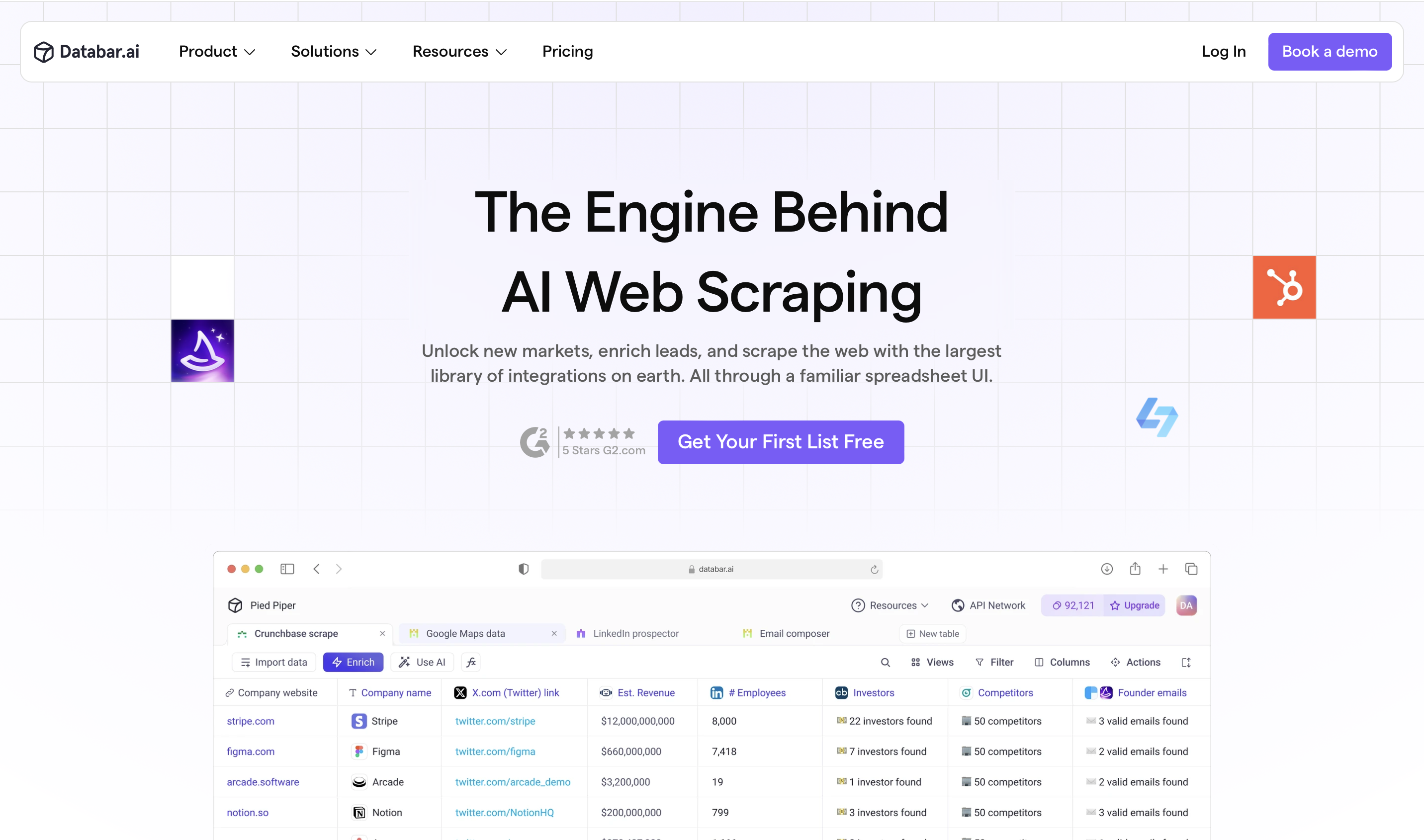
Most email finder platforms limit you to their single database, but Databar.ai changes this paradigm entirely by providing access to over 90 specialized data providers through one unified interface.
This approach solves the fundamental problem plaguing traditional contact discovery: unavoidable gaps. When Hunter.io lacks a specific email, Databar.ai automatically searches RocketReach. When RocketReach comes up empty, it tries LeadMagic, then Prospeo, then dozens of other sources until it locates verified information.
The results speak for themselves. While single-source platforms typically achieve 50-60% match rates, Databar.ai's multi-source verification consistently delivers 80-90% success rates across diverse industries and global markets.
But extensive coverage is just the beginning. The platform's AI research capabilities analyze prospect websites, recent news, hiring patterns, and social media activity to generate contextually relevant insights that enable genuine personalization at scale.
For teams requiring sophisticated prospect intelligence, Databar.ai can automatically generate research summaries, identify potential pain points, and create personalized talking points based on current company initiatives or market positioning.
Integration capabilities match the platform's data sophistication. Robust API access supports custom workflows while native no-code integrations connect seamlessly with major CRM systems, and outreach tools without requiring technical expertise.
The pricing model aligns with actual value delivered. Starting at $39 monthly with transparent credit consumption, teams pay only for successful data enrichment rather than database access fees that include unused geographic coverage or irrelevant contact segments.
International organizations particularly benefit from Databar.ai's global approach. Regional data providers within the 90+ provider network deliver local expertise.
Start your free Databar.ai trial today
2. Hunter.io
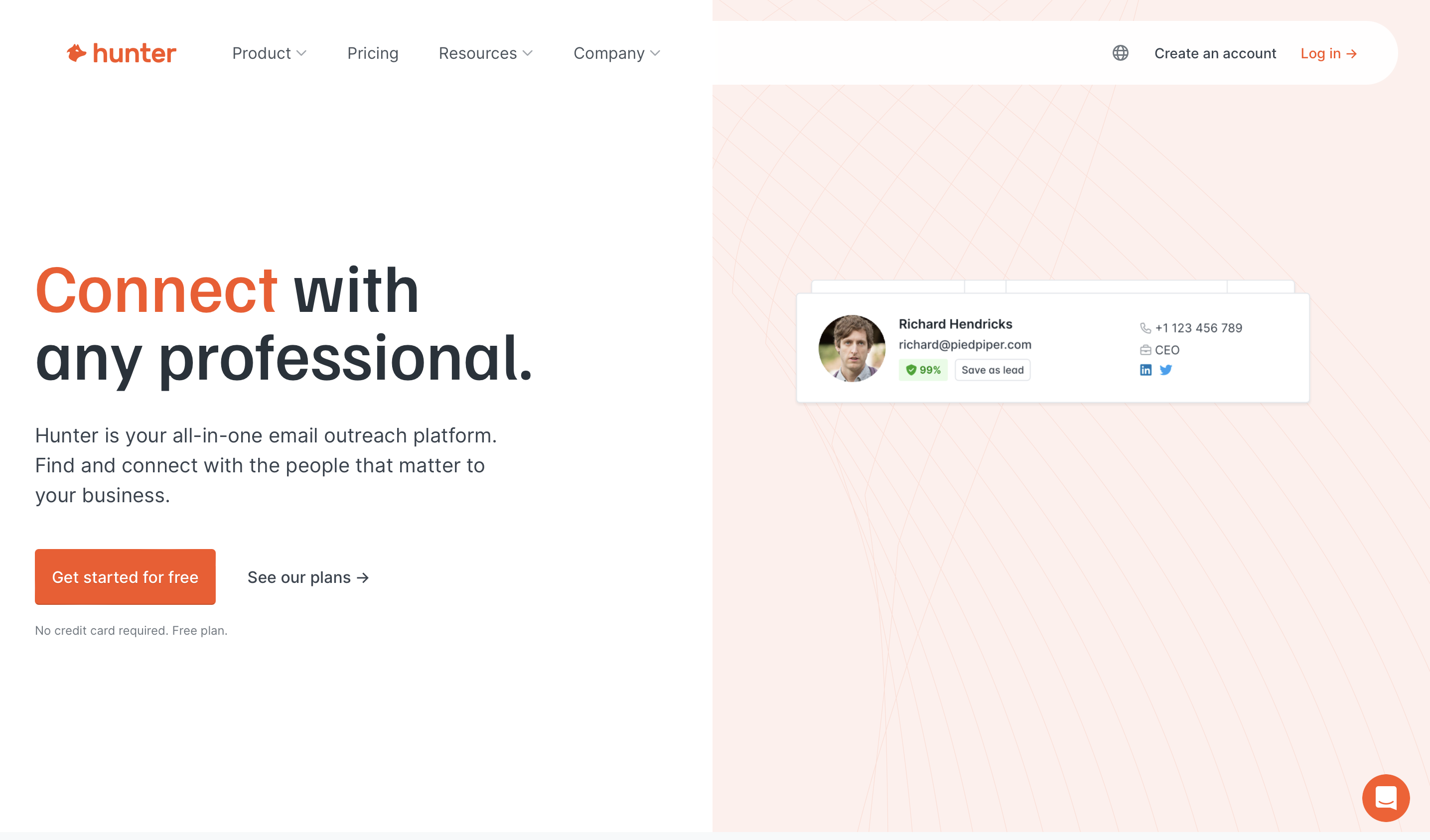
Hunter.io has built a solid reputation for discovering email patterns within company domains through sophisticated pattern recognition algorithms that analyze websites and professional directories to identify structures like firstname.lastname@company.com.
The platform's verification technology provides detailed deliverability analysis including spam trap detection and mail server validation. Developer teams appreciate the API-first architecture and comprehensive documentation for custom integrations.
Hunter.io excels at what it does - email pattern discovery and verification. The platform is particularly effective for teams primarily focused on email outreach within their core markets. For organizations needing additional data types like phone numbers or comprehensive company intelligence, Hunter.io can be effectively combined with complementary tools or multi-source platforms that include Hunter.io's capabilities alongside other specialized providers.
➔ Get started with Hunter.io inside Databar.ai today
3. Apollo.io
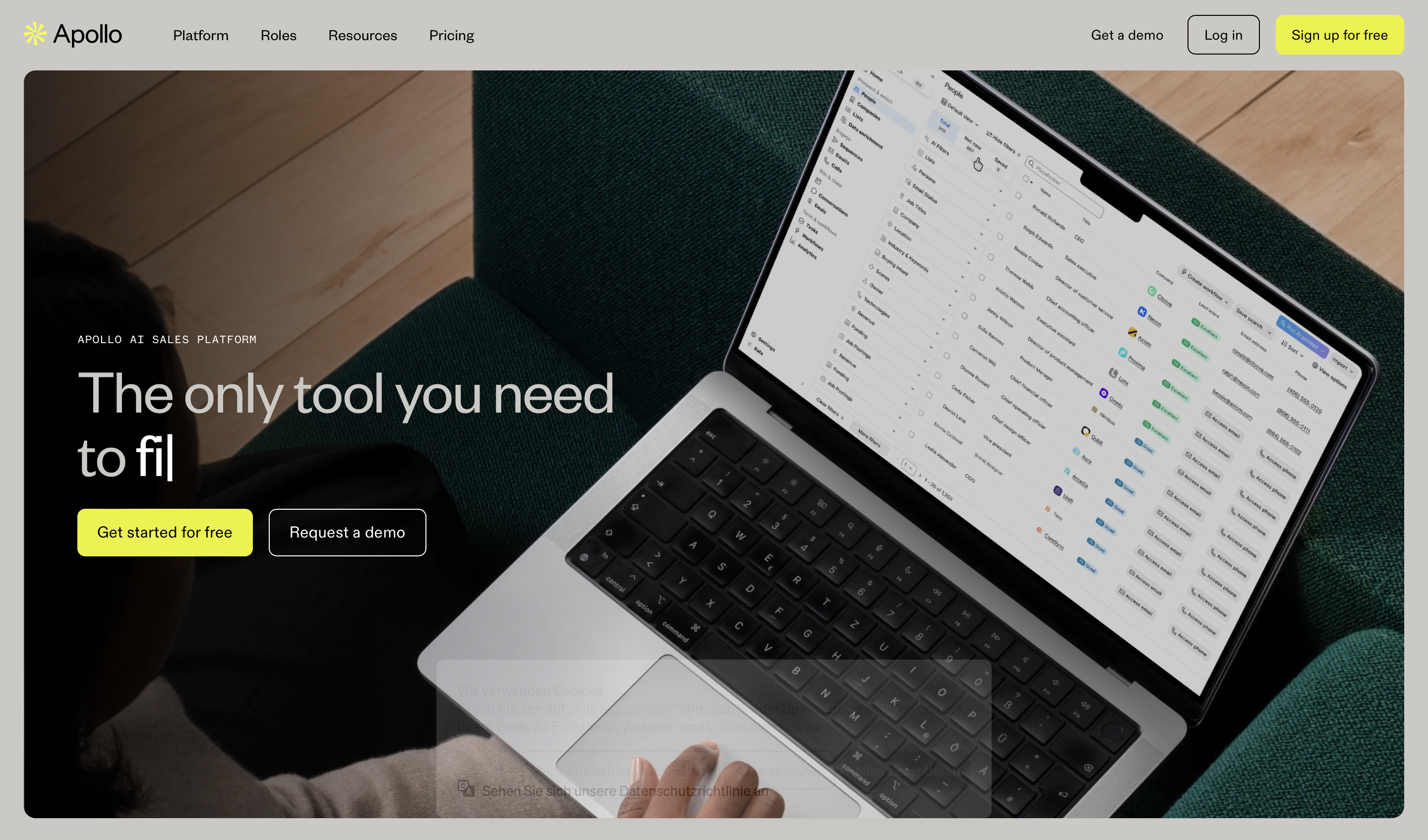
Apollo.io takes an integrated approach that combines contact discovery, sales intelligence, and engagement capabilities in a unified platform, maintaining a database of over 200 million business contacts while offering comprehensive outreach tools.
The all-in-one approach appeals to teams seeking streamlined workflows without managing multiple tool integrations. Apollo.io includes built-in email verification and technographic filtering for company technology usage tracking, making it convenient for teams starting their sales tech stack.
Apollo.io serves teams well when they prefer having everything in one place and don't require best-of-breed specialization in each area. For organizations with sophisticated requirements or established specialized tools, a multi-source approach that includes Apollo.io's data alongside other specialized providers often delivers superior results.
➔ Compare Databar.ai and Apollo.io in this detailed overview
4. RocketReach
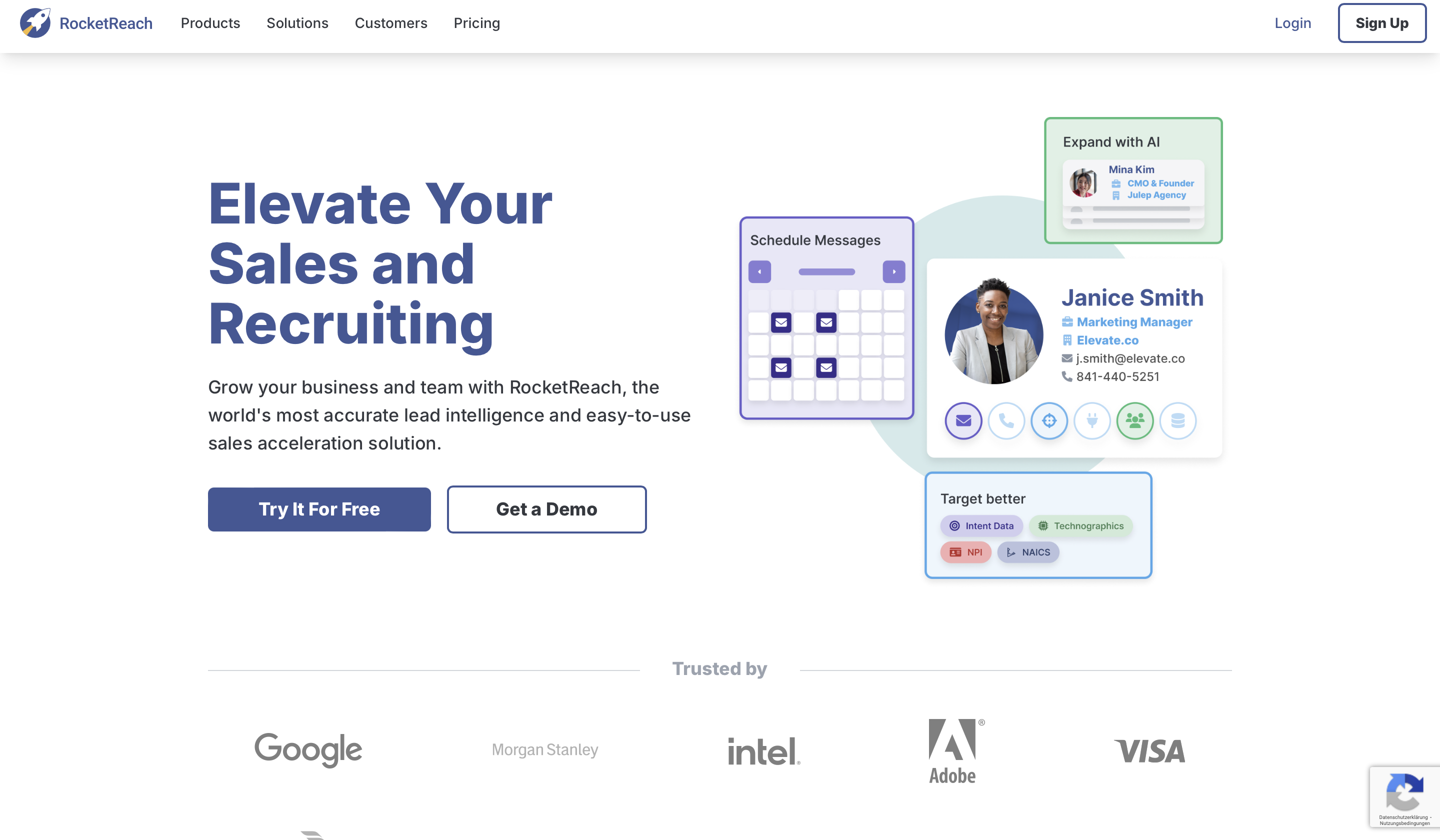
RocketReach focuses on providing comprehensive prospect profiles that include email addresses, phone numbers, and social media profiles, with advanced search capabilities for precise filtering across multiple contact types.
The platform offers robust bulk processing features and a Chrome extension for real-time contact discovery while browsing LinkedIn or company websites. RocketReach's strength lies in delivering multiple contact methods for relationship-based selling approaches.
RocketReach works well for targeted, relationship-focused prospecting where having multiple contact methods is valuable. For high-volume operations or international expansion, combining RocketReach's comprehensive profiles with other specialized providers through a multi-source platform often provides better coverage and cost efficiency.
5. Lusha
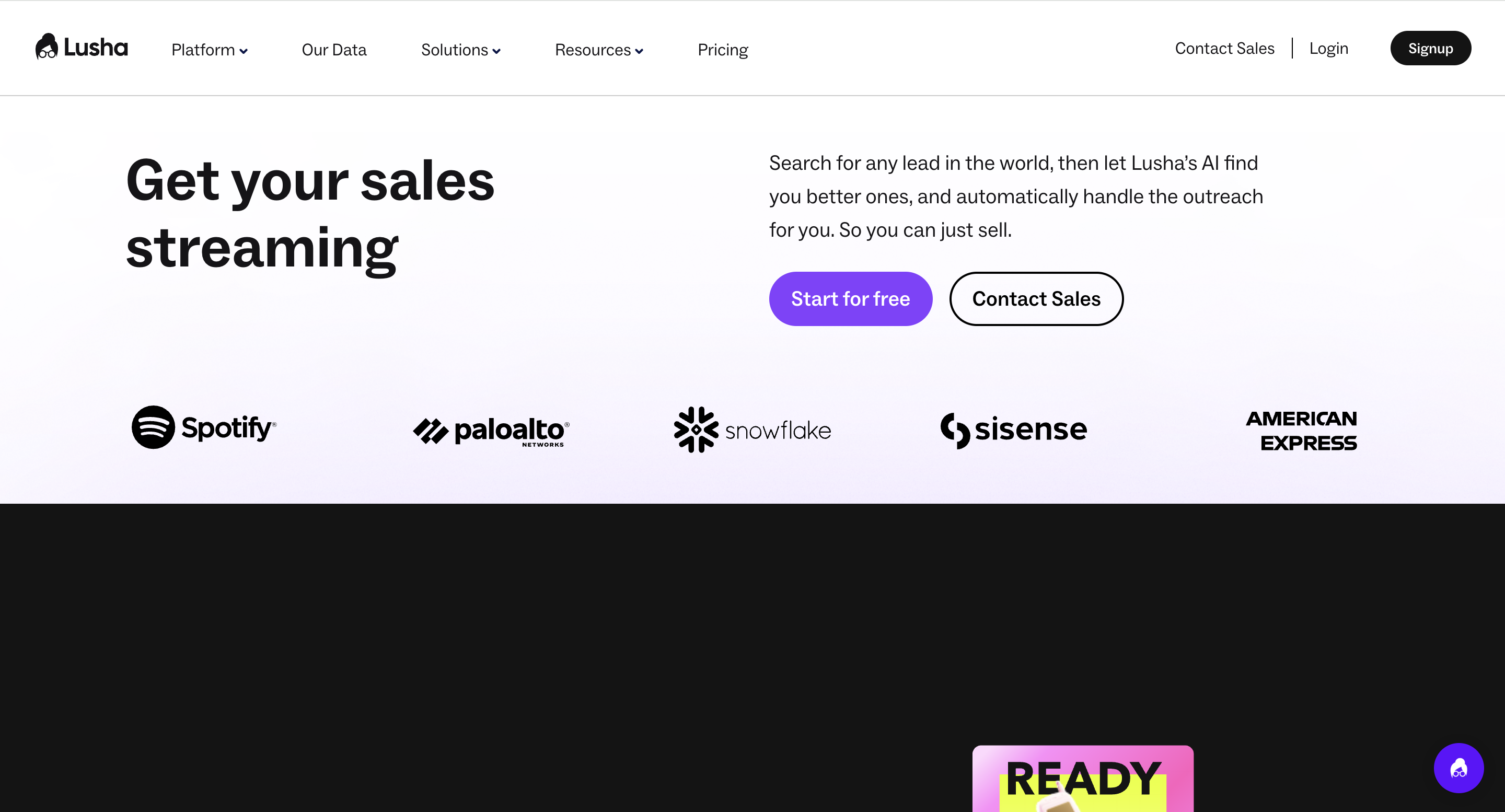
Lusha emphasizes ease of use through seamless LinkedIn integration and an intuitive interface, focusing on immediate value and professional network-based prospecting with minimal learning curve.
The platform provides verified phone numbers alongside email addresses and offers straightforward CRM integration without extensive technical configuration requirements. Lusha's strength is in making contact discovery accessible and immediate.
Lusha serves teams well for LinkedIn-based prospecting and situations where simplicity is prioritized. For comprehensive coverage beyond professional networks or international markets, Lusha's data can be effectively enhanced through multi-source platforms that include additional specialized providers for broader reach.
6. Clearbit
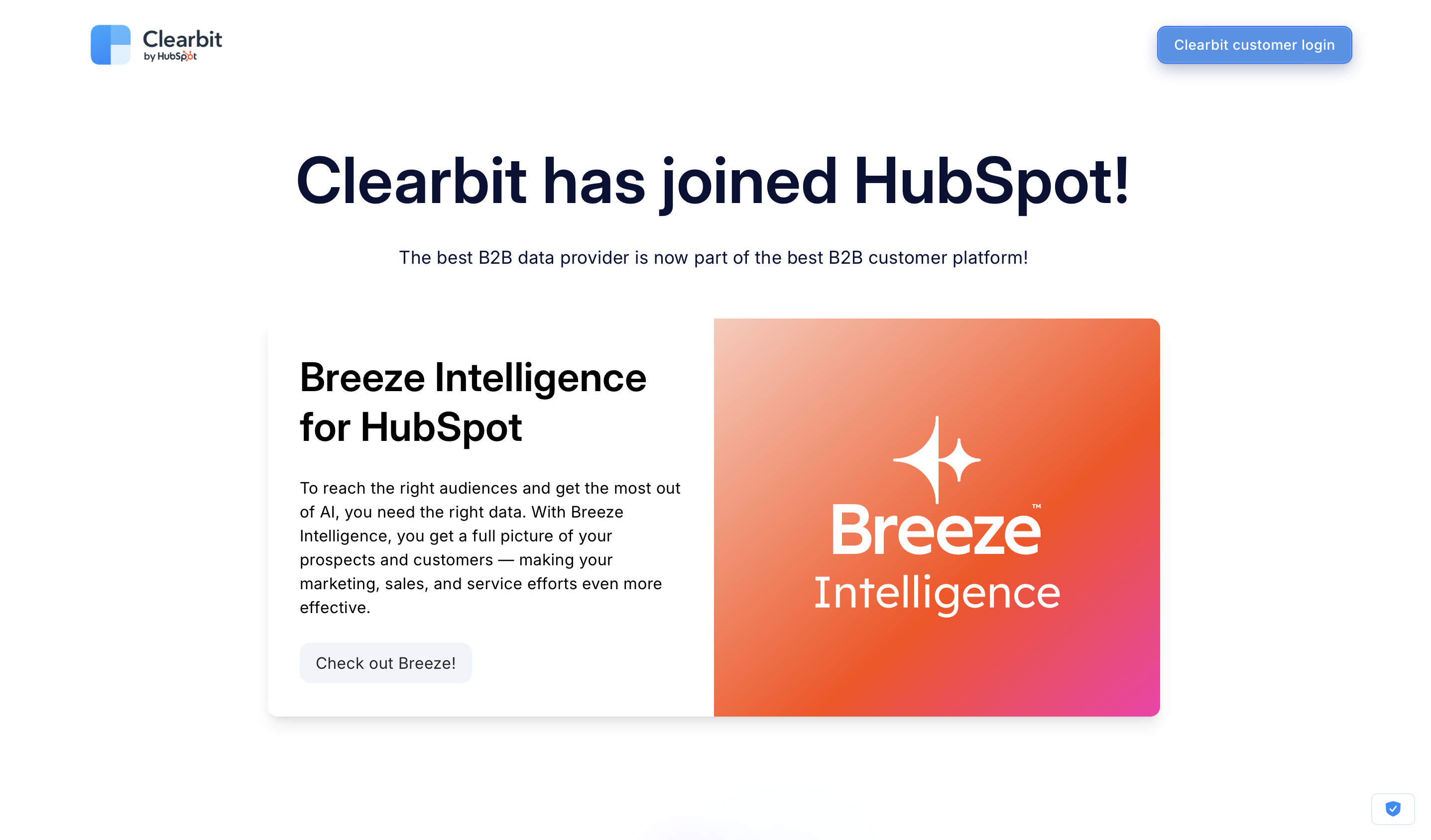
Clearbit takes a specialized approach to contact enrichment by focusing on real-time data integration through robust APIs rather than standalone contact discovery interfaces.
The platform's API-first architecture enables automatic contact enrichment as prospects enter CRM systems, providing seamless value without manual lookup processes. Marketing intelligence capabilities extend beyond basic contact information to include valuable firmographic and technographic data.
Clearbit excels for technical teams requiring automated enrichment workflows and sophisticated integrations. For teams seeking user-friendly interfaces or comprehensive standalone contact discovery, Clearbit's capabilities can be effectively combined with other providers through platforms that offer both API integration and accessible user experiences.
7. Seamless.ai
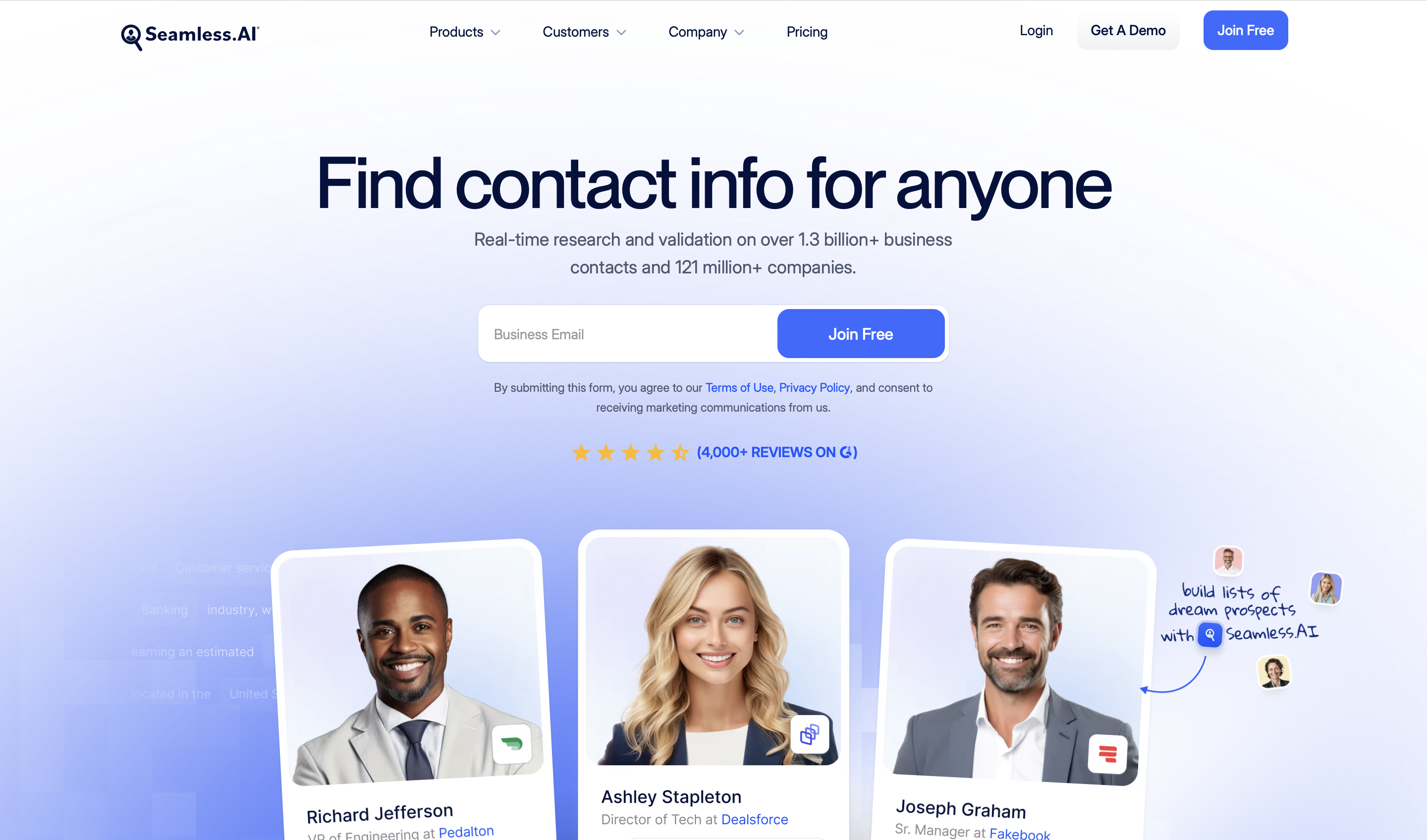
Seamless.ai addresses contact data freshness through real-time verification and AI-powered search algorithms that identify contacts even when traditional databases lack information, using intelligent pattern recognition and web analysis.
The platform's real-time approach ensures contacts are verified at discovery rather than relying on pre-existing database entries, which can be valuable for maintaining current information and reducing bounce rates.
Seamless.ai works well for teams prioritizing data freshness and willing to invest time in real-time processing. For comprehensive coverage and faster results, combining Seamless.ai's real-time capabilities with other specialized providers through a multi-source approach often delivers optimal performance.
8. ZoomInfo
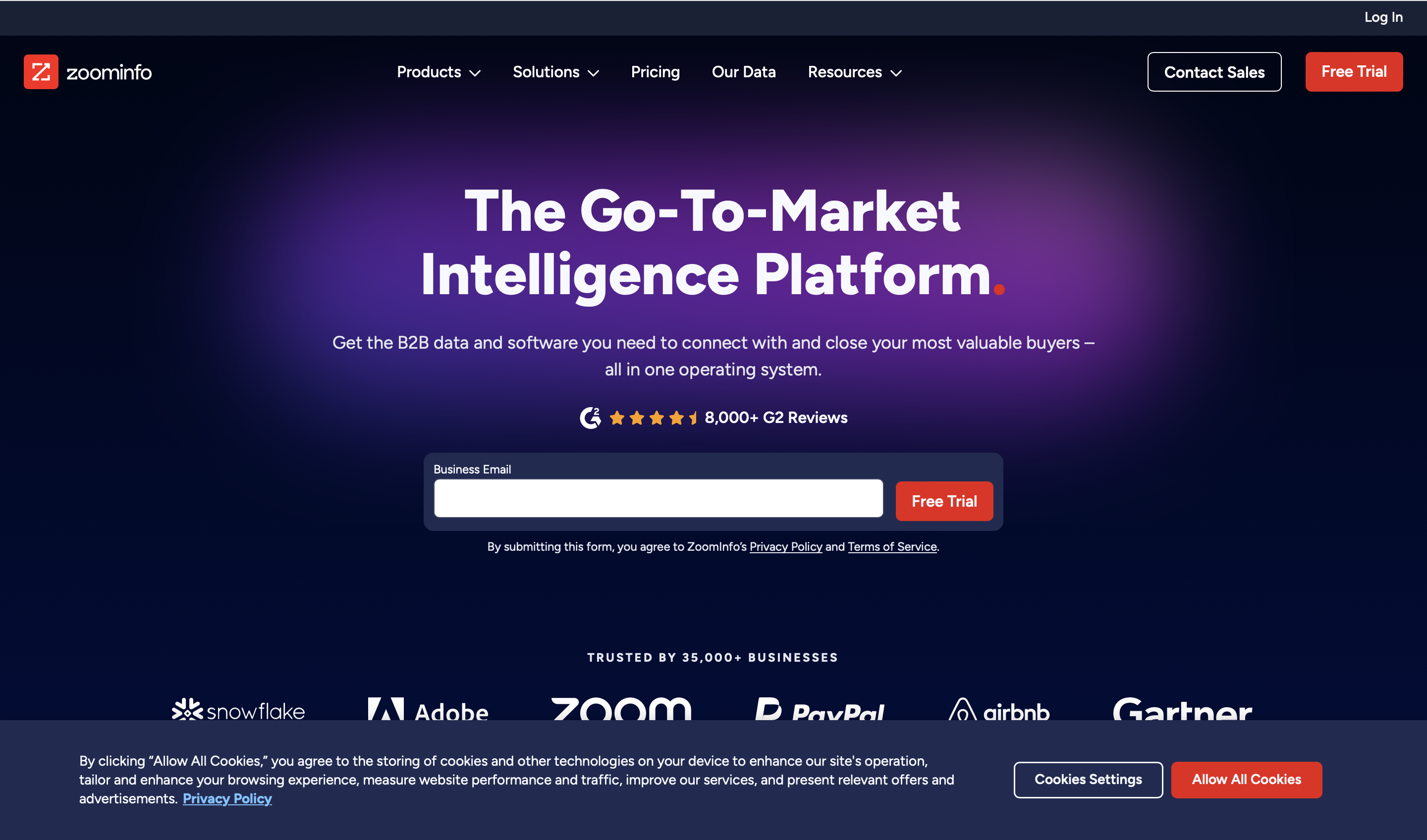
ZoomInfo provides extensive B2B intelligence with comprehensive contact databases, advanced search capabilities, and enterprise-grade features designed for large sales organizations with sophisticated requirements.
The platform offers intent data integration, organizational mapping, and comprehensive analytics for strategic account-based marketing approaches. ZoomInfo's strength lies in its depth of features and enterprise-level support capabilities.
ZoomInfo serves large enterprises well when budget allows for comprehensive sales intelligence investments. For small to mid-market organizations or those seeking more flexible pricing, multi-source platforms can provide access to ZoomInfo's data alongside other specialized providers at more accessible price points.
9. UpLead
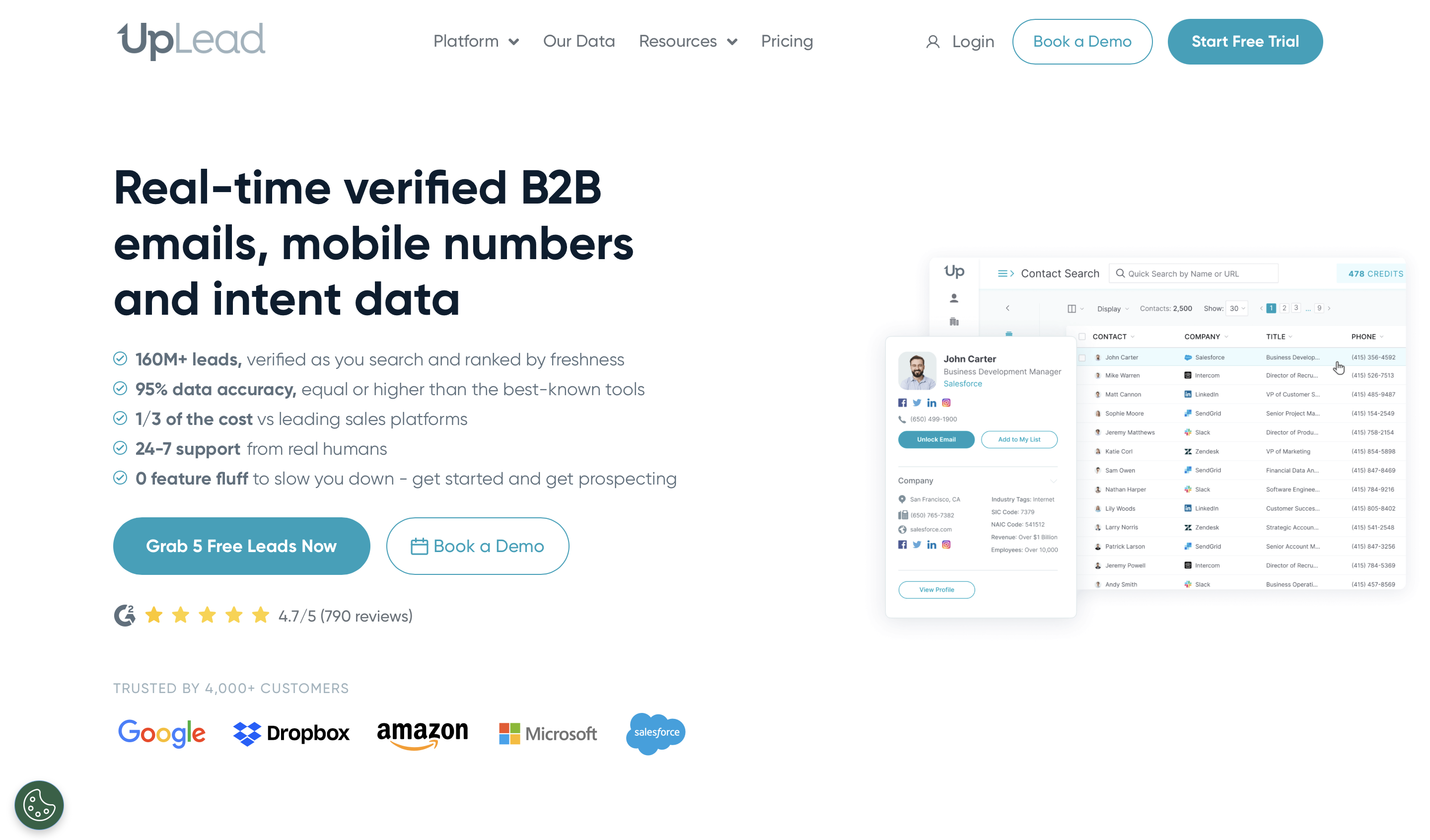
UpLead differentiates itself through a quality-first approach, charging only for verified, deliverable contact information with accuracy guarantees that ensure investment aligns with successful contact delivery.
Real-time verification technology checks email validity at the point of download, ensuring teams receive current, deliverable contact information. The platform emphasizes contact quality over database size, which appeals to teams prioritizing accuracy.
UpLead serves quality-focused teams well, particularly those with moderate volume requirements where accuracy is paramount. For comprehensive global coverage or high-volume operations, UpLead's quality focus can be effectively combined with broader coverage through multi-source platforms.
➔ Start using UpLead inside Databar with our native integration
10. Cognism
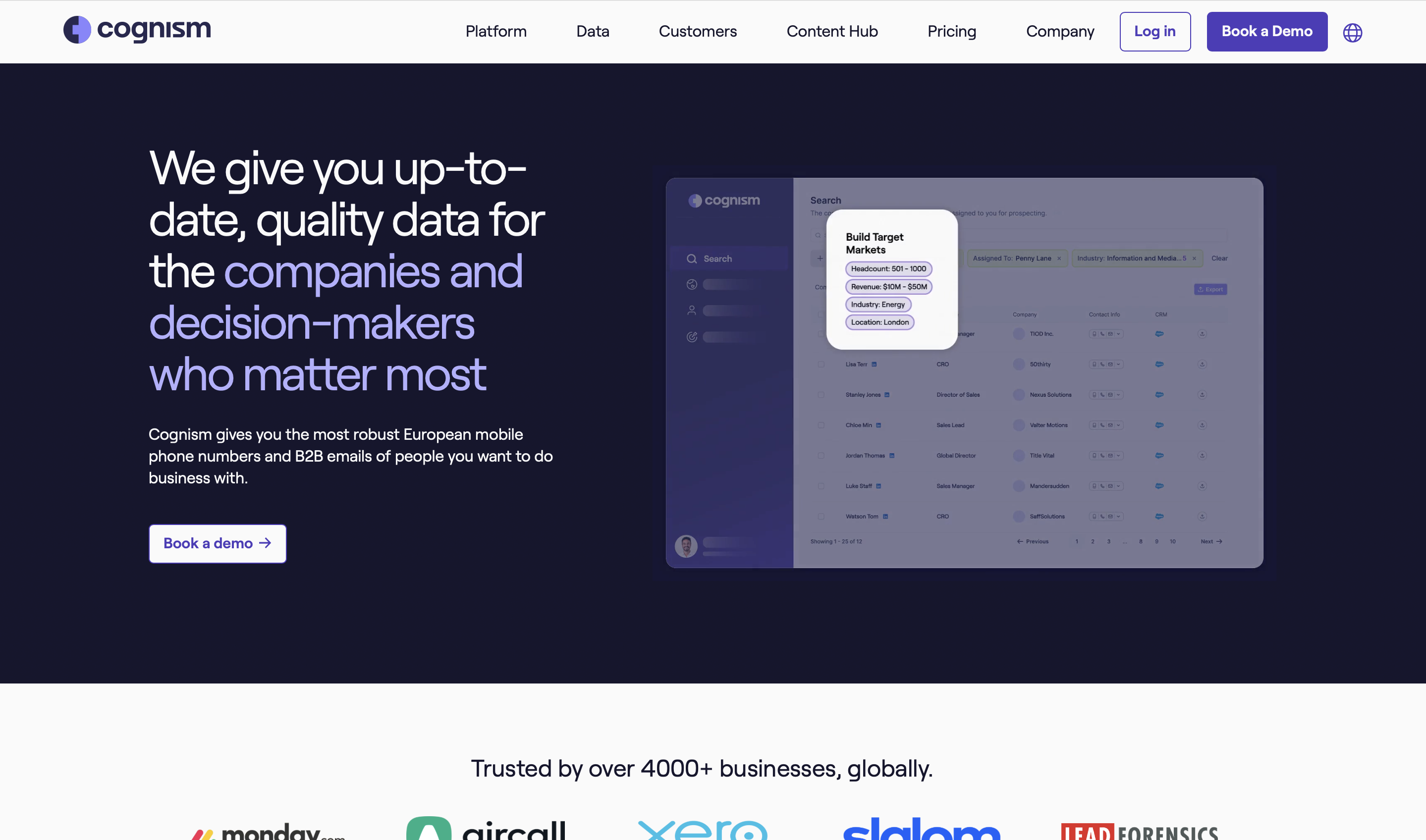
Cognism addresses the growing need for compliant contact intelligence across international markets while specializing in verified mobile phone numbers and comprehensive regulatory frameworks.
Built-in compliance capabilities provide extensive GDPR documentation and consent management that meets strict regulatory requirements. The platform's focus on mobile number verification supports direct outreach strategies for complex B2B sales cycles.
Cognism serves enterprise teams well when compliance requirements are paramount and direct phone outreach is prioritized. For broader contact discovery needs or smaller organizations, Cognism's specialized compliance and mobile capabilities can be effectively accessed through multi-source platforms alongside other providers.
Data verification and enrichment accuracy directly impacts deliverability and campaign performance. In case you're wondering how we compare to other products, understanding different verification approaches helps teams make informed decisions about DropContact alternatives. When evaluating our verification vs Apollo.io, our multi-source validation approach differs from integrated platform database matching. The distinction becomes clearer when comparing Databar.ai's workflows vs Clearbit, where our user-friendly interface contrasts with API-focused implementations that require technical expertise. Additionally, how our platform differs from SignalHire shows how multi-source email enrichment compares to single-database approaches.
Strategic Selection Guide: Why Multi-Source Beats Single-Source
The email finder landscape has a fundamental problem: single-source platforms create unavoidable gaps. When a provider lacks a contact, you're stuck. When Apollo.io's data is outdated, you waste outreach efforts. When Lusha doesn't cover your target market, you miss opportunities.
Multi-Source Advantage: Multi-source platforms like Databar.ai solve this by accessing 90+ specialized providers. When one source lacks information, the system automatically checks dozens of alternatives until it finds verified data.
Platform Comparison by Core Requirements:
For Maximum Contact Discovery Success:
- Single-source platforms: 50-60% match rates (Hunter.io, Apollo.io, Lusha)
- Multi-source platforms: 80-90% match rates (Databar.ai)
- Why: Access to multiple specialized providers
For Global Coverage:
- Regional limitations: Most platforms struggle outside North America/Europe
- Local expertise: Multi-source approach includes regional specialists for every market
- Compliance: Comprehensive frameworks vs. basic privacy controls
For Technical Integration:
- Basic APIs: Limited customization options
- Enterprise complexity: Requires dedicated technical resources
- Flexible integration: Robust APIs accessible to all team sizes
Migration Strategy: Making the Transition
Successfully moving from an email finder requires systematic planning that maintains contact discovery effectiveness while accessing enhanced capabilities.
Begin by documenting current performance metrics including contact discovery success rates, accuracy levels, and geographic coverage effectiveness. These baselines help evaluate improvement after migration and justify platform investment decisions.
Test shortlisted alternatives with actual prospect data representing your typical contact discovery requirements. Focus on match rates, accuracy verification, and workflow integration rather than feature comparisons that may not reflect real-world performance.
Plan gradual implementation starting with specific prospect segments or geographic regions to validate new platform capabilities before complete migration. This approach minimizes risk while allowing optimization of new workflows and integration configurations.
Configure integrations with existing CRM systems and sales tools, ensuring data flow maintains consistency and contact management processes remain efficient throughout the transition period.
Provide comprehensive team training emphasizing new capabilities that address previous limitations while maintaining productivity during the learning curve associated with platform changes.
Monitor performance improvements including contact accuracy, discovery success rates, and workflow efficiency during initial months to optimize configuration and identify additional enhancement opportunities.
The Advantage of Multi-Provider Solutions: Why Single-Source Platforms Fall Short
The contact intelligence landscape has evolved beyond simple email lookup to require comprehensive, verified global coverage that single-source platforms simply cannot provide due to inherent database limitations.
The Single-Source Problem: Traditional email finders like Hunter.io, Apollo.io, and Lusha limit you to their proprietary databases. When they lack a contact, you're stuck. When their data is outdated, you waste outreach efforts. When they don't cover your target market, you miss opportunities entirely.
Why Multi-Source Wins: Databar.ai fundamentally solves this problem by providing access to 90+ specialized data providers through one unified interface. When Hunter.io lacks a specific email, Databar.ai automatically searches RocketReach. When RocketReach comes up empty, it tries Prospeo, then LeadMagic, then dozens of other sources until it locates verified information.
The Results Speak for Themselves:
- Single-source platforms: 50-60% match rates
- Multi-source approach: 80-90% success rates
- Cost efficiency: One platform vs. multiple subscriptions
- Global coverage: Data sources for every market
Email Finder Software Trends 2025: The email finder market is shifting toward multi-source aggregation as single-provider limitations become more apparent. Modern sales teams require comprehensive global coverage that no single database can provide, driving adoption of platforms that combine multiple specialized providers.
B2B Contact Database Development: Traditional contact databases built from single sources create unavoidable gaps in coverage and accuracy. The future belongs to platforms that aggregate specialized providers while maintaining verification standards across all sources.
Best Practices for Email Enrichment Tools: Successful contact intelligence strategies rely on platforms that provide transparent accuracy metrics, comprehensive global coverage, and flexible integration capabilities rather than the largest claimed database sizes.
Ready to Experience Superior Contact Intelligence? Stop settling for the gaps and limitations of single-source platforms. Start your free Databar.ai trial today and access extensive coverage through 90+ specialized providers with transparent pricing and enterprise-grade capabilities.
Related articles
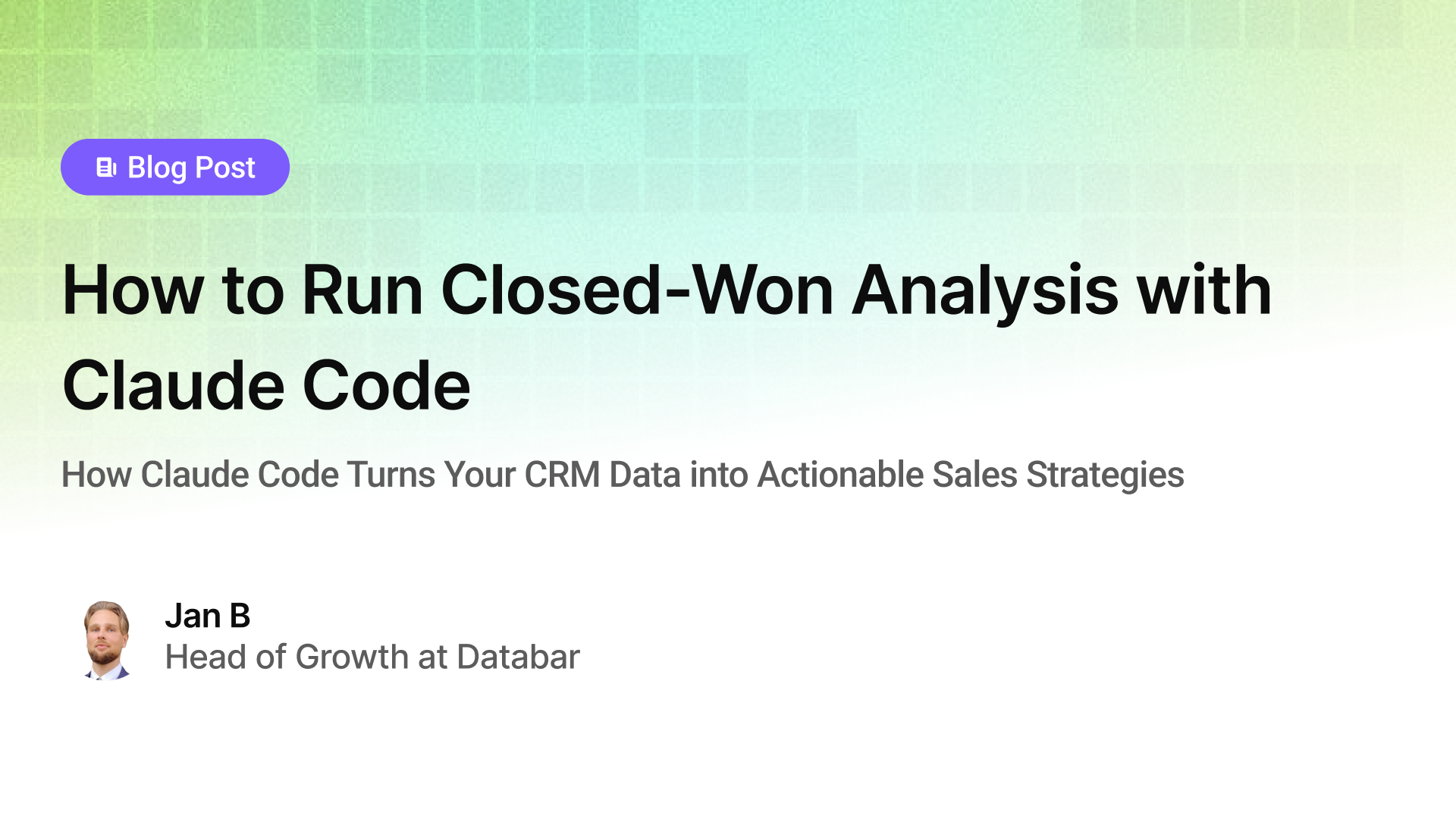
How to Run Closed-Won Analysis with Claude Code
How Claude Code Turns Your CRM Data into Actionable Sales Strategies
by Jan, February 21, 2026
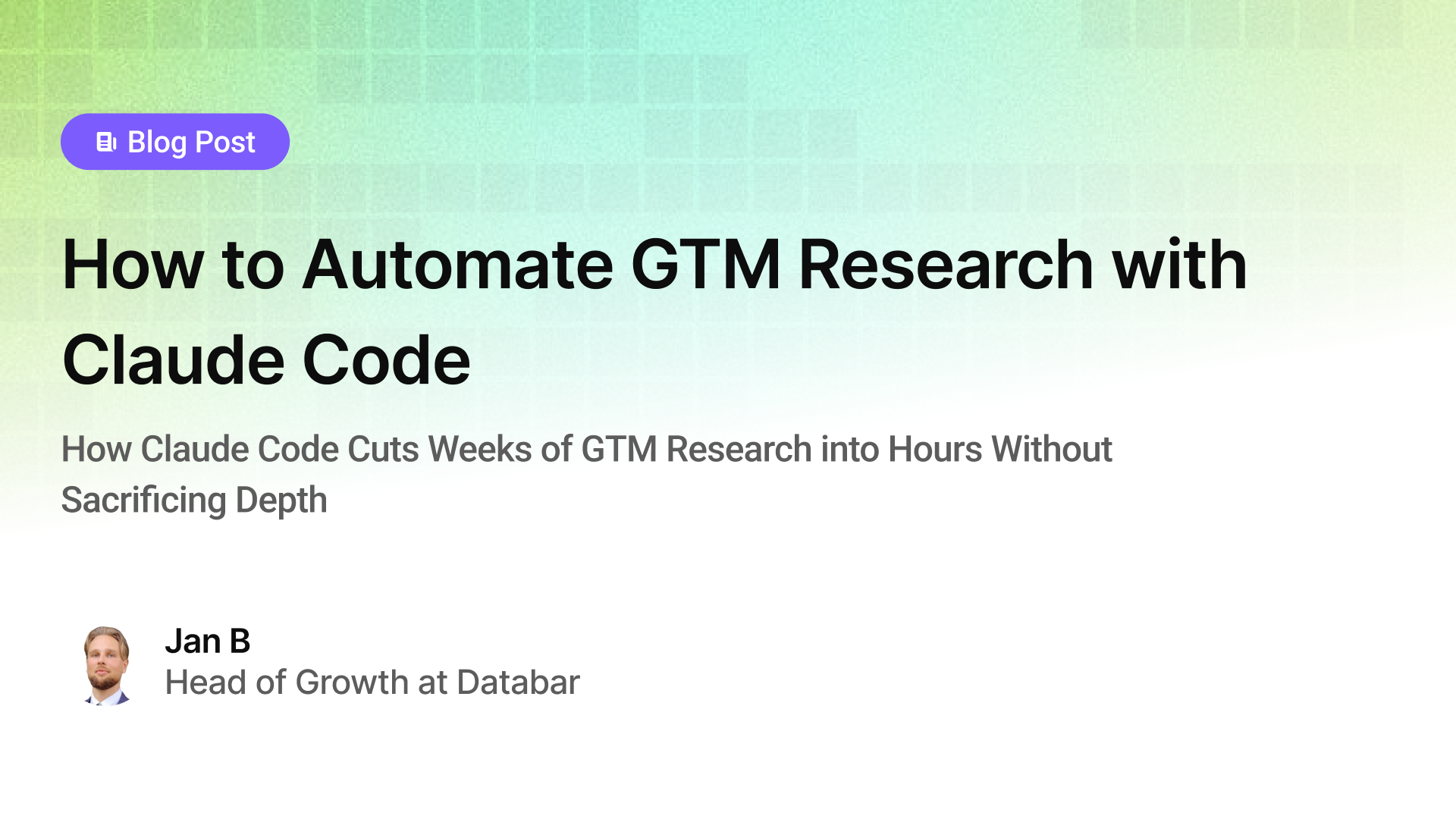
How to Automate GTM Research with Claude Code
How Claude Code Cuts Weeks of GTM Research into Hours Without Sacrificing Depth
by Jan, February 20, 2026
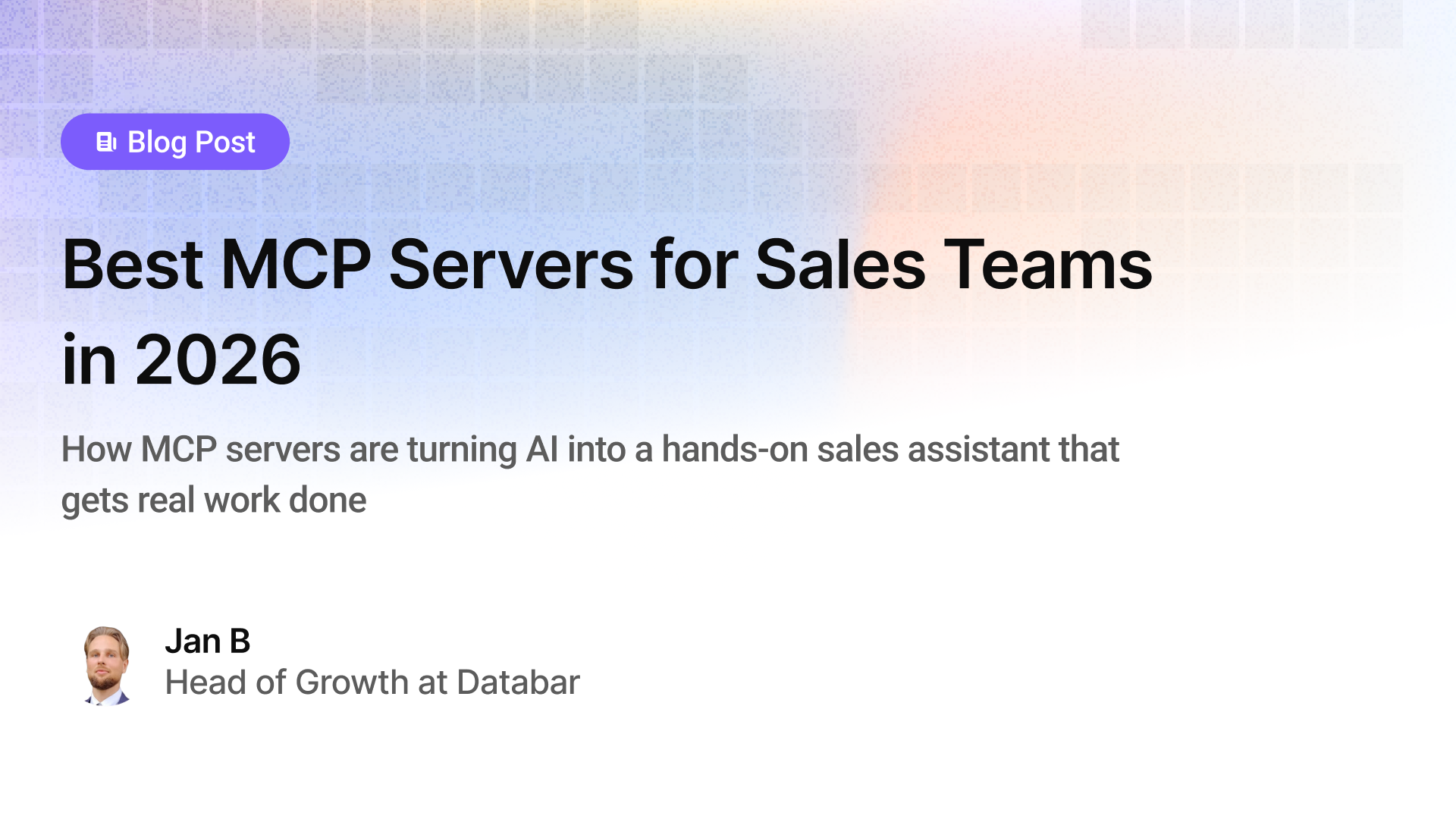
Best MCP Servers for Sales Teams in 2026
How MCP servers are turning AI into a hands-on sales assistant that gets real work done
by Jan, February 20, 2026
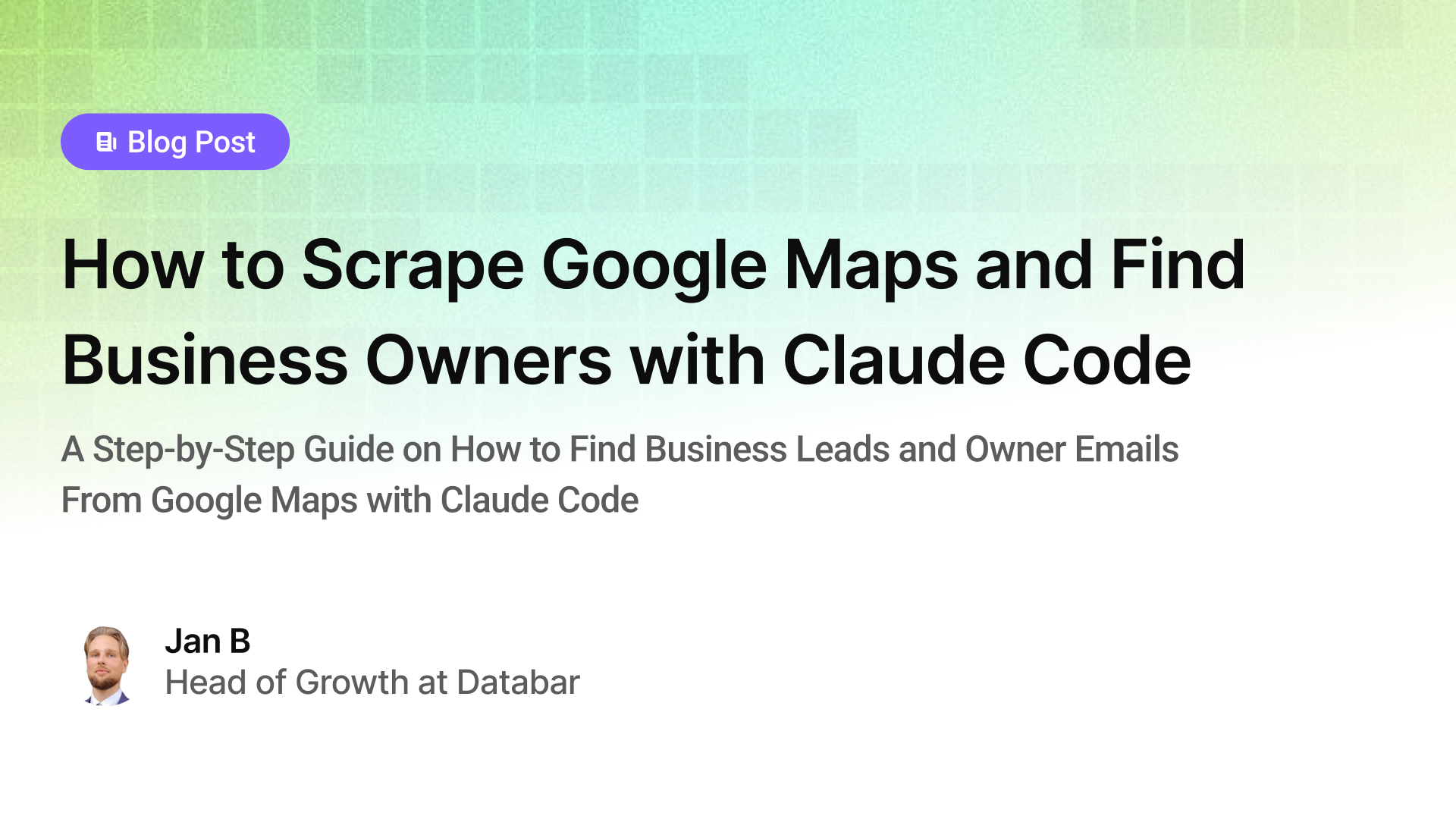
How to Scrape Google Maps and Find Business Owners with Claude Code
A Step-by-Step Guide on How to Find Business Leads and Owner Emails From Google Maps with Claude Code
by Jan, February 19, 2026